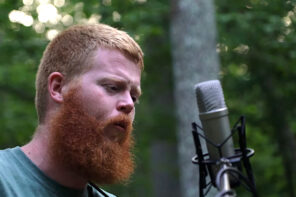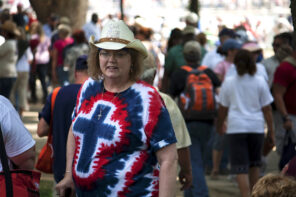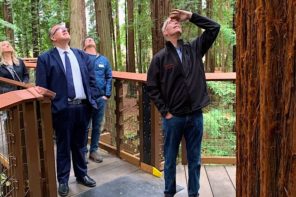Another survey, another indication that religious life in the United States can no longer be captured by surveys. According to “Faith in Flux,” a recent survey by the Pew Forum on Religion and Public Life, Americans change their religious affiliation at least once in their lives, and the largest-growing group in what the report poetically describes as the “churn within American religion,” is the “unaffiliated”—an amorphous community of former Catholics and Protestants (including other traditions, no doubt) that challenges the normal boundaries we use to identify, measure, and account for religion.
A few points are clear: religious commitments are temporal and changing; generational shifts and phases of life can reorient religious identity; and spiritual needs are not being fulfilled in conventional religious institutional settings and communities.
The past is certainly more complicated than we can imagine, but the religious present is even more confusing and confounding than graphs, percentiles, and questionnaires are able to capture. No doubt, the kinds of questions and the range of answers contained in “Faith in Flux” open our eyes to a shifting and shifty religious landscape, spiritual ground not quite as stable and secure as theologians and statisticians would like it to be in the twenty-first century.
Given the kind of map these surveys are drawing, there’s only one game in town for scholars of religion: the surge in no religion and non-affiliated statuses, and even more specifically, seeking signs of religious life among the increasing number of those who self-identify with no religion. In order to pursue that path, we have to do away with one of the most obfuscating, irritating, and limiting words bandied about by too many in public discourse: faith and faith communities. In the land of no religion, faith, as a domesticated catchword for Christians, Jews, Muslims, Buddhists and Hindus of every stripe and strand, is out the window.
When faith, affiliation and tradition no longer apply, the possibility for religious life is not dead but remains vital and viable. Without a religion to tie you down, one can still be religious and access something sacred in some form or other. Signs of religious life without religion are everywhere, though capturing and measuring these non-affiliated sacred investments and activities is as elusive for the social science-minded and the parochial scientist, as it is for the know-it-all journalist and the know-nothing policy wonk who still believe it’s possible to define religion definitively and operationally.
Wilco Show: As Meaningful as a Religious Service
Religious life outside of faith communities is elusive and unstable, though if you look and listen carefully, the sacred begins to surface when people describe certain experiences from a variety of so-called secular domains: sports arenas and political rallies; hospital rooms and movie theaters. Hell, even rock and roll can be religious to some of the people some of the time.
Case in point: Wilco, a band that emerged from the ashes of Uncle Tupelo behind leader Jeff Tweedy back in the mid-1990s, touring and releasing nine albums to date. Spanning musical genres that include country, alt-country, blues rock, experimental, folk, and straightforward rock, Wilco has a fairly strong legion of fans though they have never had any major hits and do not sell out stadiums. But regardless of degree of popularity, something very special can happen at their concerts for fans, and the band itself, which requires a religious vocabulary to capture adequately.
In a review of the recently released DVD concert, Ashes of American Flags, PopMatters columnist Michael Franco discusses the film’s somber depiction of a fading American landscape by focusing on unique concert venues like the Ryman in Nashville that are disappearing from view in corporate-minded America, as well as its uplifting celebration of the band’s energy and musical talents on display in these settings. Rather than deliver a eulogy, Franco writes, the images from concerts in these places tell a different story, a religious story that “is evident in the footage of the fans, engaging in a ritual that is, for them, every bit as meaningful as a religious service.” A throwaway line based on misinformed applications of comparative religion? Yet one more demonstration of the ill-informed masses making hyperbolic statements about what is like religion? The author continues with his own personal testimonial to the religious quality of a Wilco show for some people, sometimes: “It’s easy to see why a band like Wilco inspires such devotion. They are, quite simply, transcendent on stage…..”
On the other side of the stage, Jeff Tweedy has commented in interviews what his experience can be at rock concerts—his own but also as an audience member himself:
AVC: You were once quoted as saying that performing on stage was the closest you could imagine to a religious experience. Can you elaborate?
JT: I don’t remember saying that. I do remember feeling that way, but I don’t remember placing myself onstage so much. It doesn’t necessarily matter if I’m onstage or not. I just find the communal experience of a rock concert, or any type of music performance, achieves a kind of transcendence that I associate with spirituality. It’s the closest thing to what I think people expect church to be like. Or maybe just what I’ve always thought church should be. It’s as close to it as I feel like I’ve gotten. You lose yourself, and at the same time come to the realization or understanding that you’re part of something bigger than yourself. That’s the main function of religion, in my mind.
A brief digression about an almost-famous rock band suggests the possibility that faith may be in flux, but the sacred has many potential anchors outside of Great Books, Faith Traditions, and Sites of Worship, including, simply, music and musical subcultures. Americans young and old, rich and poor, atheist and faithful, have turned to music as a sacred source of religious life, discovering in the rhythms, beats, and lyrics a valuable way to escape (if only momentarily) the mundane realities of this world for a higher ground. But the sacred does not only offer otherworldly escape from this world. Music can be religious in every sense of the word, a meaningful alternative to traditional religion that generates moral perspectives, special communities, and life-altering transformations in tune with divine energies.
Music is much more than what you hear. It inhabits and alters the body, but at the same time has the potential to create disembodied, nonmaterial bonds among individuals that tie them together in memorable, often ritually appealing ways. It is a definitively social and somatosensory experience that can, in some cases, bind American communities together through a shared sense of the sacred, achieved during extraordinary moments of transcendence and regeneration—like those often reported by participants in the revival-like, religious atmosphere of momentary collective musical communities found in jazz clubs, rock shows, and raves, to name only a few.
The connection between music and religion is deeply rooted in human history and widespread across the cultural spectrum, with many theories suggesting integral links between the two in the formation of human societies. British psychologist Anthony Storr writes in Music and the Mind:
The origins of music may be lost in obscurity but, from its earliest beginnings, it seems to have played an essential part in social interaction. Music habitually accompanies religious and other ceremonies. Some anthropologists have speculated that vocal music may have begun as a special way of communicating with the supernatural.
Music plays a special role in human evolution and no doubt operates as a prime mover in the formation of communities, societies, and cultures through time and in the present.
Any investigation of the American religious landscape must take music into account as a biological and sociological force of solidarity and group identity, along with its pervasive, longstanding role as a source for sacred life: crucial ingredients in the mix of dynamic, sometimes politically powerful, religious cultures. I may be wrong, but it is highly unlikely Pew or any other foundation will support a survey about the religious role of music in everyday life. Should that time come it isn’t difficult to consider other potential avenues for investigation when the conventional options are put aside and the rise of no religion forces a conceptual shift about what counts as religion.




